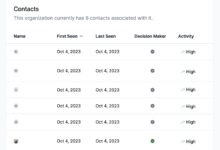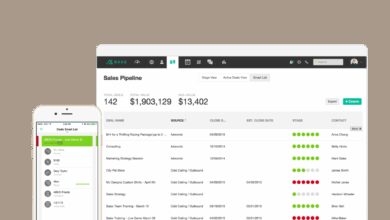CRM Based Products: 7 Ultimate Power Tools for Growth
In today’s hyper-connected business world, staying ahead means more than just selling—it’s about building relationships. Enter CRM based products: the ultimate game-changers transforming how companies engage customers, streamline operations, and scale smarter. Let’s dive into the tools reshaping modern business.
What Are CRM Based Products and Why They Matter

Customer Relationship Management (CRM) based products are software solutions designed to help businesses manage interactions with current and potential customers. These tools centralize customer data, automate workflows, and provide insights that drive smarter decisions across sales, marketing, and customer service.
Defining CRM Based Products
CRM based products encompass a wide range of platforms and tools that focus on improving customer relationships through data organization, communication tracking, and process automation. These systems collect customer information from multiple channels—email, phone, social media, websites—and store it in a unified database accessible across departments.
- They track customer interactions in real time.
- They enable personalized communication at scale.
- They integrate with other business tools like email, calendars, and e-commerce platforms.
According to Salesforce, over 80% of businesses report improved customer satisfaction after implementing CRM based products.
Core Components of CRM Systems
A typical CRM system includes several key modules that work together to enhance customer engagement. These components are essential for any business looking to leverage CRM based products effectively.
- Sales Force Automation: Tracks leads, manages pipelines, and automates follow-ups.
- Marketing Automation: Enables targeted campaigns, lead scoring, and performance analytics.
- Customer Service & Support: Offers ticketing systems, knowledge bases, and live chat integrations.
“CRM is no longer just a tool for sales teams—it’s the backbone of customer-centric organizations.” — Gartner Research
Types of CRM Based Products
CRM based products come in various forms tailored to different business needs and sizes. Understanding these types helps organizations choose the right solution.
- Operational CRM: Focuses on automating customer-facing processes like sales, marketing, and service.
- Analytical CRM: Emphasizes data analysis to understand customer behavior and improve strategies.
- Collaborative CRM: Enhances communication between departments and external partners to deliver seamless customer experiences.
Each type serves a unique purpose, but most modern CRM based products blend all three functionalities for maximum impact.
Top 7 CRM Based Products Powering Modern Businesses
The market for CRM based products has exploded in recent years, with dozens of platforms offering varying features, pricing, and scalability. Here’s a deep dive into the seven most powerful CRM based products dominating the industry in 2024.
1. Salesforce Sales Cloud
Salesforce remains the undisputed leader in CRM based products, with its Sales Cloud offering unmatched flexibility and depth. It’s used by over 150,000 companies worldwide, from startups to Fortune 500 enterprises.
- AI-powered insights via Einstein Analytics.
- Customizable dashboards and reporting tools.
- Extensive app ecosystem through the AppExchange.
Salesforce integrates seamlessly with marketing automation tools like Pardot and service platforms like Service Cloud, making it a complete suite for end-to-end customer management. Learn more at Salesforce Official Site.
2. HubSpot CRM
HubSpot CRM stands out for its user-friendly interface and free entry-level plan. It’s ideal for small to mid-sized businesses looking to grow without breaking the bank.
- Free CRM with contact management, email tracking, and deal pipelines.
- Seamless integration with HubSpot’s marketing, sales, and service hubs.
- Powerful automation workflows and templates.
One of the biggest advantages of HubSpot as a CRM based product is its ecosystem. Users can scale from free tools to enterprise-level solutions without switching platforms. Visit HubSpot CRM to explore its full capabilities.
3. Zoho CRM
Zoho CRM offers a robust set of features at a fraction of the cost of competitors. It’s particularly popular among small businesses and startups due to its affordability and scalability.
- AI assistant ‘Zia’ for predictive forecasting and sentiment analysis.
- Multi-channel communication (email, phone, social, chat).
- Highly customizable workflows and blueprints.
Zoho also provides industry-specific editions for real estate, education, and healthcare, making it one of the most versatile CRM based products available. More details at Zoho CRM.
4. Microsoft Dynamics 365
For organizations already using Microsoft 365, Dynamics 365 is a natural fit. This CRM based product integrates deeply with Outlook, Teams, and Excel, offering a unified experience.
- Powerful AI and machine learning capabilities.
- Advanced sales forecasting and relationship insights.
- Flexible deployment options (cloud, on-premise, hybrid).
Dynamics 365 is especially strong in enterprise environments where data security and compliance are critical. Explore it at Microsoft Dynamics.
5. Pipedrive
Pipedrive is built for sales teams that prioritize pipeline visibility and deal progression. Its visual interface makes it easy to track where each prospect stands.
- Drag-and-drop sales pipeline management.
- Activity reminders and automated workflows.
- Strong mobile app for on-the-go access.
It’s one of the most intuitive CRM based products for sales-focused businesses. Pipedrive’s strength lies in simplicity without sacrificing functionality. Learn more at Pipedrive.
6. Freshsales (by Freshworks)
Freshsales combines CRM functionality with built-in phone, email, and chat capabilities, making it a complete communication hub.
- AI-based lead scoring and sentiment analysis.
- Voice, video, and chat integration within the platform.
- Real-time engagement tracking and analytics.
It’s particularly effective for teams that want an all-in-one solution without relying on third-party tools. Check it out at Freshsales.
7. Oracle CX Sales
Oracle’s CRM based product is designed for large enterprises with complex sales cycles and global operations.
- Advanced AI for forecasting and recommendations.
- Deep integration with ERP and supply chain systems.
- Global compliance and multi-language support.
While it has a steeper learning curve, Oracle CX Sales delivers enterprise-grade performance and scalability. Discover more at Oracle CX.
Key Features to Look for in CRM Based Products
Not all CRM based products are created equal. Choosing the right one requires understanding which features will deliver the most value to your business. Here are the essential capabilities to evaluate.
Contact and Lead Management
At the heart of every CRM based product is the ability to store and organize customer data. Effective contact management allows teams to track interactions, segment audiences, and personalize outreach.
- Automated data capture from emails, forms, and calls.
- Duplicate detection and merge tools.
- Custom fields and tagging for better segmentation.
This feature ensures no lead falls through the cracks and enables targeted marketing campaigns.
Automation and Workflow Tools
One of the biggest advantages of CRM based products is automation. Repetitive tasks like follow-up emails, task assignments, and status updates can be automated to save time and reduce errors.
- Trigger-based actions (e.g., send email when lead opens a link).
- Approval workflows for deals or discounts.
- Task scheduling and reminders.
Automation not only boosts productivity but also ensures consistency in customer communication.
Reporting and Analytics
Data-driven decision-making is impossible without robust reporting. The best CRM based products offer customizable dashboards, real-time analytics, and forecasting tools.
- Sales performance reports (conversion rates, win/loss analysis).
- Customer behavior insights (engagement trends, churn risk).
- Marketing ROI tracking across channels.
These insights help businesses refine strategies and allocate resources more effectively.
Benefits of Using CRM Based Products
Implementing CRM based products isn’t just a tech upgrade—it’s a strategic move that impacts every part of the organization. The benefits extend far beyond the sales team.
Improved Customer Relationships
With a centralized view of every customer interaction, teams can deliver more personalized and timely service. This leads to higher satisfaction and loyalty.
- Access to complete customer history across touchpoints.
- Proactive support based on usage patterns.
- Personalized recommendations and offers.
According to a study by Nucleus Research, businesses gain $8.71 for every dollar invested in CRM based products, largely due to improved customer retention.
Increased Sales Efficiency
Sales teams spend less time on admin and more time selling. CRM based products automate routine tasks, prioritize high-value leads, and provide real-time guidance.
- Faster lead response times (critical for conversion).
- Better pipeline visibility and forecasting accuracy.
- Reduced manual data entry errors.
Teams using CRM based products report up to 30% increase in sales productivity.
Enhanced Collaboration Across Teams
CRM based products break down silos between departments. Marketing, sales, and customer service can share insights and coordinate efforts seamlessly.
- Shared calendars and activity logs.
- Internal commenting and @mentions.
- Unified customer profiles accessible to all teams.
This alignment ensures a consistent customer experience, regardless of which team they interact with.
Challenges and Common Pitfalls with CRM Based Products
Despite their many advantages, CRM based products can fail if not implemented correctly. Understanding common challenges helps organizations avoid costly mistakes.
Poor User Adoption
One of the biggest reasons CRM implementations fail is low user adoption. Employees may resist change, especially if the system is complex or poorly trained.
- Lack of buy-in from frontline staff.
- Perceived as extra work rather than a tool to help.
- Inadequate training and onboarding.
Solution: Involve users early, provide hands-on training, and highlight time-saving benefits.
Data Quality Issues
A CRM is only as good as the data it contains. Incomplete, outdated, or duplicate records undermine its effectiveness.
- Manual data entry errors.
- Inconsistent formatting across teams.
- No data governance policies.
Regular audits, validation rules, and integration with data enrichment tools can improve data quality.
Integration Complexity
Many CRM based products need to connect with existing tools like email, accounting software, or e-commerce platforms. Poor integration leads to data silos and inefficiencies.
- Limited API access or outdated connectors.
- Custom integrations requiring developer resources.
- Sync delays between systems.
Choose CRM based products with strong integration ecosystems and pre-built connectors.
How to Choose the Right CRM Based Product for Your Business
Selecting the right CRM based product requires careful evaluation of your business needs, budget, and long-term goals. Here’s a step-by-step guide to making the best choice.
Assess Your Business Needs
Start by identifying your primary objectives. Are you looking to boost sales, improve customer service, or scale marketing efforts?
- Map out key processes that need automation.
- Identify pain points in current customer management.
- Determine required features (e.g., email integration, mobile access).
This clarity will help narrow down options and avoid overpaying for unnecessary features.
Consider Scalability and Flexibility
Your CRM should grow with your business. Look for platforms that offer tiered pricing, modular features, and customization options.
- Can it handle increased users and data volume?
- Does it support industry-specific workflows?
- Is there a mobile app for remote teams?
Scalability ensures you won’t outgrow the system within a year.
Evaluate Vendor Support and Training
Even the best CRM based product is useless without proper support. Check the vendor’s reputation for customer service, training resources, and community forums.
- Availability of live chat, phone, and email support.
- Onboarding assistance and documentation.
- User communities and knowledge bases.
Strong vendor support reduces downtime and accelerates adoption.
Future Trends in CRM Based Products
The CRM landscape is evolving rapidly, driven by AI, automation, and changing customer expectations. Staying ahead means understanding where CRM based products are headed.
AI and Predictive Analytics
Artificial intelligence is no longer a luxury—it’s becoming standard in CRM based products. AI powers features like lead scoring, sentiment analysis, and next-best-action recommendations.
- Predictive forecasting of customer behavior.
- Automated email drafting and response suggestions.
- Real-time coaching for sales reps during calls.
Platforms like Salesforce Einstein and Zia from Zoho are already delivering these capabilities.
Hyper-Personalization
Customers expect personalized experiences at every touchpoint. CRM based products are leveraging data to deliver tailored content, offers, and support.
- Dynamic website content based on visitor profile.
- Personalized email journeys using behavioral triggers.
- Custom product recommendations in real time.
This level of personalization increases engagement and conversion rates.
Integration with Emerging Technologies
CRM based products are expanding beyond traditional channels to include voice assistants, IoT devices, and blockchain for secure data sharing.
- CRM integration with smart speakers for hands-free updates.
- IoT data feeding into CRM to predict maintenance needs.
- Blockchain for transparent customer consent management.
These integrations will redefine how businesses interact with customers in the coming years.
What are CRM based products?
CRM based products are software tools designed to help businesses manage customer interactions, streamline sales processes, and improve customer service by centralizing data and automating workflows.
Which CRM based product is best for small businesses?
HubSpot CRM and Zoho CRM are among the best CRM based products for small businesses due to their affordability, ease of use, and scalable features.
How do CRM based products improve sales?
CRM based products improve sales by automating follow-ups, providing real-time insights, enhancing lead management, and increasing team collaboration, leading to higher conversion rates and shorter sales cycles.
Can CRM based products integrate with other tools?
Yes, most CRM based products offer integrations with email, marketing automation, e-commerce, and accounting tools via APIs or pre-built connectors to ensure seamless data flow.
Are CRM based products worth the investment?
Yes, CRM based products deliver significant ROI by improving customer retention, increasing sales efficiency, and enabling data-driven decision-making across the organization.
CRM based products have evolved from simple contact managers to intelligent, integrated platforms that power modern business growth. Whether you’re a startup or a global enterprise, choosing the right CRM can transform how you engage customers and operate internally. From Salesforce to HubSpot, Zoho to Microsoft Dynamics, the options are vast—but the key is aligning the tool with your business goals. As AI, automation, and personalization continue to shape the future, investing in a robust CRM based product isn’t just smart—it’s essential for staying competitive in today’s customer-driven economy.
Further Reading:








